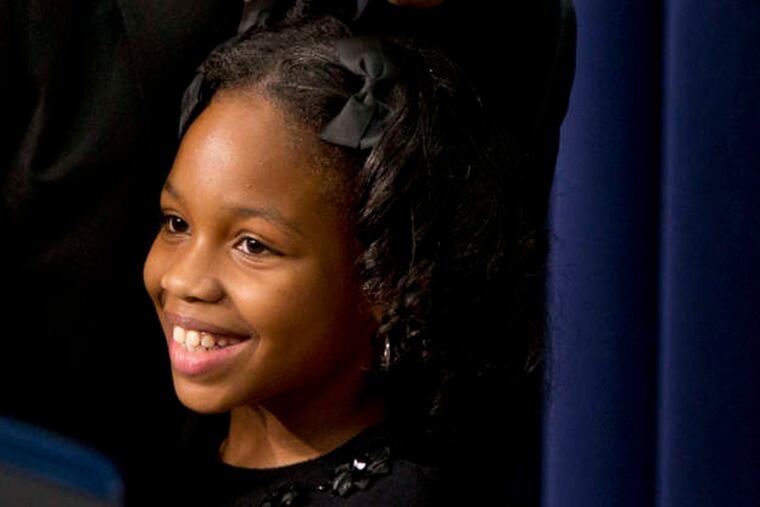Race relations in Obama era
Recent protests over police killings have shown that the black-white divide may have actually widened.

WASHINGTON - When President Obama was elected the nation's first black president in 2008, it suggested a move toward a post-racial America, the kind of society that the Rev. Dr. Martin Luther King Jr. envisioned in his "I Have a Dream" speech nearly a half-century before.
No doubt, the votes of a majority of U.S. voters for an African American was a watershed of monumental proportion. But six years into the Age of Obama, relations between blacks and whites are arguably worse in communities across the nation.
As protesters take to the streets after a pair of grand juries decided not to indict white police officers for killing unarmed black men in Missouri and New York, it's clear that America's long-standing racial divide not only remains but has deepened.
"We are more racially fractured and fragmented," said James Peterson, director of Africana studies at Lehigh University.
"It has exposed more wounds than it has healed," he said of Obama's election. "It has exposed how racist our society still is."
Obama has pushed for a slew of policies to boost blacks, with some success: increasing access to health care, making college more affordable, and changing sentencing guidelines. And he launched My Brother's Keeper, a program designed to empower young minority men.
Yet vast disparities between blacks and whites remain. Blacks earn less money, graduate from college at lower rates, and are imprisoned at disproportionately higher rates than whites. The unemployment rate for blacks is more than double the national average, 11.1 percent, while it's 4.9 percent for whites, according to the Bureau of Labor Statistics.
Improving African Americans' quality of life may help empower them and narrow the quantifiable gap between black and white. But ultimately race relations comes down to what's in a person's head. And even the first black president can't change how people feel about each other.
"You have to separate steps that can be done that level the playing field and ensure justice from how people feel in their hearts," senior Obama adviser Valerie Jarrett said in an interview. "We have been evolving for generations now. . . . That's not something you can just simply change in six years, but we can certainly make progress and move in the right direction."
A new McClatchy-Marist Poll finds voters divided over whether Obama's race helped or set back race relations. By 43 percent to 34 percent, voters think the fact that the country has an African American president has helped rather than hurt.
Whites and Latinos think it has helped, by percentages of 44-35 and 46-25, respectively. But African Americans think it has hurt race relations rather than helped, by 42 percent to 33 percent.
The number of people who think blacks and whites do not get along has increased throughout Obama's presidency, from 19 percent in late 2009 to 28 percent in 2014, according to polls conducted by the Pew Research Center and USA Today.
In 2013, just before the 50th anniversary of King's speech, fewer than half - 45 percent - of Americans said the country had made substantial progress toward racial equality. About the same share - 49 percent - said that "a lot more" remains to be done.
Obama's election brought race to the forefront. And some say it led Obama to face an increased number of death threats and less cooperation in Washington.
"I think racial issues have really gotten worse," said Colette Flanagan, an African American who founded the group Mothers Against Police Brutality after her 25-year-old son was killed last year by a white police officer in Dallas. A grand jury declined to indict the officer.
Still, Obama says Americans should not discount the progress that has been made.
"If you look at the history of race in America, it's usually not a single moment when suddenly everything gets solved. It's a process," Obama said last week on the Spanish-language network Univision. "We have to recognize that issues of racial prejudice and discrimination, they're embedded deeply in society, and they don't transform overnight, but each successive generation, what we've seen in America is we've seen improvement."
Obama rose to national prominence with a stirring speech at the 2004 Democratic National Convention in which he envisioned a post-racial America. "There is not a black America and a white America and Latino America and Asian America - there's the United States of America," he said.
Obama's election was a source of pride for many blacks, especially for older people who never thought they would see a president who looked like them in their lifetime. It remains of tremendous symbolic significance to many.
"It showed enormous progress in our country that he was able to be elected not once, but twice," Jarrett said. ". . . But I think that he looks at it as a larger arc than just over his presidency and would certainly say we have made progress but we still have a ways to go."
Obama reluctantly dives into the national debate over race, usually only after a high-profile incident, and he has not made it a focus of his presidency.
"I don't think he ever said that we have become race neutral as a society, but we certainly have made an enormous amount of progress," Jarrett said. "If there are people who are frustrated with his efforts so far, he would encourage them to join that fight. It will be a lot easier to achieve that goal with the kind of support that we are seeing around the country."